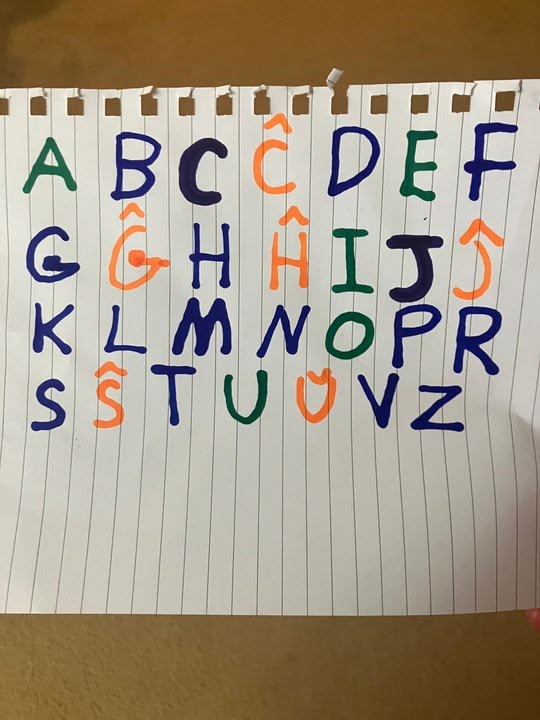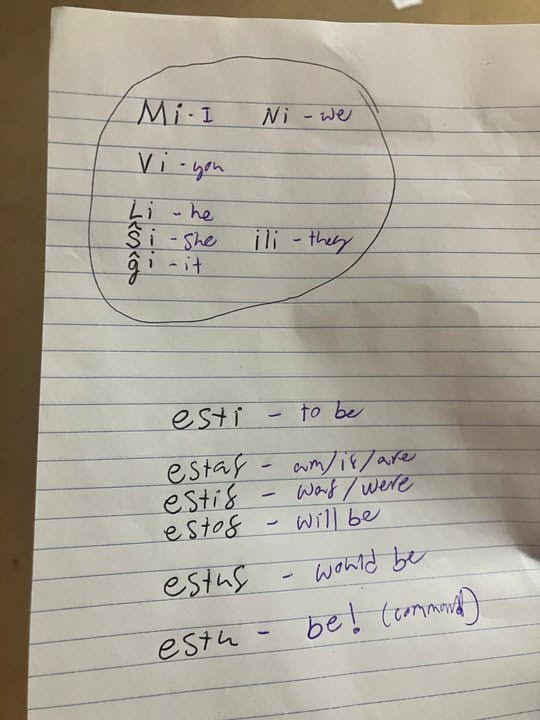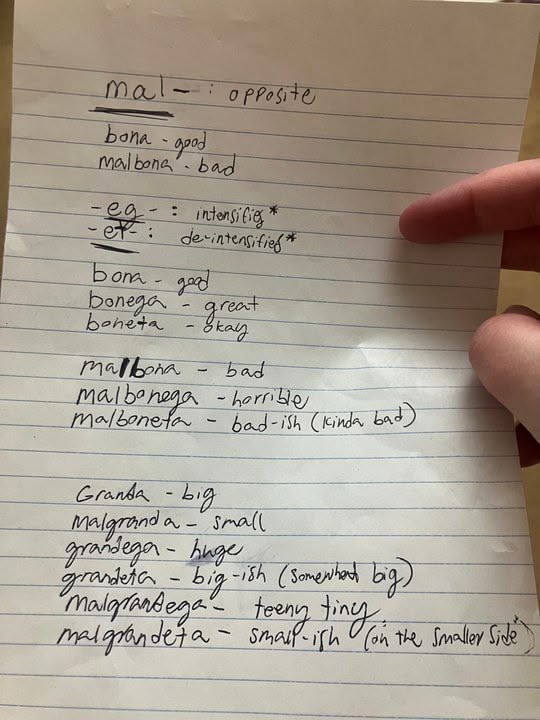Teaching my friend Esperanto, trying really hard not to get frustrated
This is a relatively new friend, sort of. He was someone who maybe like 6 months ago hit me up on Instagram wanting to hang out. He had seen my tinder profile, and found me on Instagram. He wanted to hook up, but I told him I wasn’t interested, and said if we hung out it would just be as friends. He was like okay cool let’s hang out as friends, but over the course of the maybe 10 times we hung out, he kept making little comments and a few times even straight up asked me if I’d ever want to hook up with him, to which I said no. The final time he asked, I was basically like “why do you keep asking me that? I already said no.” He got all butthurt, said he didn’t want to be friends with me, and blocked me on everything. Of course I sent him some choice words from an alternate number.
Fast forward to last month, he hit me up with a lengthly apology, said he’d get it if I hated him but he realized what a good friend I was and wanted to be friends again. I made him promise to not ask about hooking up anymore, he agreed, so I was like okay.
So yeah that’s basically how we became friends.
Now one cool thing about him is that he really takes an interest in things that I’m interested in. He was happy to start watching one of my favorite shows with me (Legion, on FX). But more significantly, he wants me to teach him Esperanto (my favorite constructed language and the language I speak second best; I’m semi-proficient). Exciting stuff, I’ve never had a friend want to learn Esperanto with me, let alone have me teach it to them. It’s something I’m passionate about, so it’s quite cool.
The only thing is, I’m having a bit of trouble with patience. I don’t think I’m particularly impatient, I don’t mind the challenge of finding different ways to explain something to someone if they don’t get it, or even repeating the same explanations a few times. People have told me before that I should be a teacher; I don’t want to, because I don’t like children, and I’d need a PhD to teach adults, but I’m at least OKAY at helping people learn. Well, most people.
You see, my friend is, quite frankly, severely lacking in some very basic cognitive skills. His capacity for logical reasoning and deduction are on par with elementary schoolers. He’s 32. I’d honestly have a much easier time teaching your average 4th grader. He’s very willing to learn, which I super appreciate and remind myself of to dampen the frustration, but it takes him multiple hours and days to learn things that would take most 30something adults maybe 20 minutes to an hour to get down.
Let me give some examples. The last 4 days we’ve hung out we’ve been going over the Esperanto alphabet, and he still struggles to remember how to pronounce things. Esperanto uses a modified Latin script, that’s not too far off from English and Spanish (he also speaks Spanish, which makes it all the more frustrating he still hasn’t gotten it). It’s 28 letters, entirely phonetic (one sound per letter), even more so than Spanish. So you understand, the alphabet is as follows:
a b c ĉ d e f g ĝ h ĥ i j ĵ k l m n o p r s ŝ t u ŭ v z.
Vowels are pronounced like in Spanish, except e is more like the e in English pet than in Spanish café. Regular consonants are basically pronounced like they are in Spanish and English. R is trilled like in Spanish, c is like ts like in tsunami, j is pronounced like English consonant y, like in yes. And as far as the ones with diacritics, ĉ is like English/Spanish ch, ĝ is an English soft g like in generate (regular g is hard like in go), ĥ is that harsh sound often stylized as ch or kh and is like the ch in Chanukah, ĵ is like the s in measure, ŝ is like English sh, and ŭ is like a w after a vowel in English (words cannot begin with ŭ).
I made him a color-coded paper
I’ve had him sing the alphabet at least 20 times (you can sing it to the same tune as the English alphabet song: “ah bo tso cho doe eh foe, go joe ho kho* ee yo zho*, ko low mo no oh po roe, so show toe oo woah vo zo”). After 4 different days of it he still doesn’t have it down, and seems to not even be able to say the letters in order. Like yesterday it literally went like this:
Him, practicing: “ah, bo, so—“
Me, correcting him: “tso.”
Him: “ah, bo, tso… cho? Doe… …” (he literally didn’t know how to pronounce e even though he speaks Spanish)
Me: “…eh.”
Him: “right! Eh… bo, that’s the next one right?”
Me: “does b come after e in the English alphabet?”
Him: “🧐… ohhh right right”
He did a little better when I wrote out a list of words for him to pronounce, but still fails at certain letters every single time.
All that was just alphabet and pronunciation stuff, stuff got a bit sadder with grammar and vocabulary.
I made him this information sheets with pronouns and all 6 possible verb endings:
I gave him a little worksheet with some simple sentences for translation. Literally just the following sentences:
I am good
She was good
It will be good
We were good
They will be good
He is good
I showed him that for each of them he would only be choosing between 3 verb endings, the ones for past, present, and future. I also wrote on the sheet “bona(j) — good” and explained that if the pronoun is singular, then good is bona, and if it’s plural, it’s bonaj. I triple checked that he knew what “plural” meant. He seemed pretty lost as to what to do, so I told him he just had look at the word written in English (first the pronoun) and find the corresponding Esperanto word on the info sheet, then find the correct verb conjugation for the tense (there were only 3 he had to choose from) and then put “bona” if it was a singular pronoun, and “bonaj” if it was plural. Essentially no different than using a translation dictionary. He was like “uhhh okay, I mean I’ll try my best…” he took quite a while and handed me the paper when he was done. He got the pronouns and their verbs right, but instead of writing “bonaj” for Ni (we) and ili (they) and “bona” for the rest, he literally wrote “bona(j)” for all of them 🤦♀.
Okay, I’ve taken a good amount of time to complain here, but I wanna make it clear that I haven’t actually shown a lack of patience towards him (I keep my impatience on the inside) and I am really glad to have a friend who’s giving me the opportunity to share something I’m passionate about. And a little exercise in patience surely can’t be a bad thing. I just need to vent at the moment, but I put my feelings here instead of telling them to him because I don’t want to make him feel bad, especially with the opportunity he’s giving me. I just have to remember to appreciate his willingness to learn. I’m actually really pleasantly surprised, I asked him today if he was burnt out and wanted a break, and he said no, that he was having fun learning a language from me. As long as he’s got a positive attitude about it, I have to maintain mine. Of course a little anonymous online venting is sometimes needed to keep me balanced 😌.
There was one more thing he really struggled with that I forgot to add, but I’ve already said plenty, so I’ll just say it was an exercise based on this info sheet I made him:
Ĝis, ĉiuj!
Fast forward to last month, he hit me up with a lengthly apology, said he’d get it if I hated him but he realized what a good friend I was and wanted to be friends again. I made him promise to not ask about hooking up anymore, he agreed, so I was like okay.
So yeah that’s basically how we became friends.
Now one cool thing about him is that he really takes an interest in things that I’m interested in. He was happy to start watching one of my favorite shows with me (Legion, on FX). But more significantly, he wants me to teach him Esperanto (my favorite constructed language and the language I speak second best; I’m semi-proficient). Exciting stuff, I’ve never had a friend want to learn Esperanto with me, let alone have me teach it to them. It’s something I’m passionate about, so it’s quite cool.
The only thing is, I’m having a bit of trouble with patience. I don’t think I’m particularly impatient, I don’t mind the challenge of finding different ways to explain something to someone if they don’t get it, or even repeating the same explanations a few times. People have told me before that I should be a teacher; I don’t want to, because I don’t like children, and I’d need a PhD to teach adults, but I’m at least OKAY at helping people learn. Well, most people.
You see, my friend is, quite frankly, severely lacking in some very basic cognitive skills. His capacity for logical reasoning and deduction are on par with elementary schoolers. He’s 32. I’d honestly have a much easier time teaching your average 4th grader. He’s very willing to learn, which I super appreciate and remind myself of to dampen the frustration, but it takes him multiple hours and days to learn things that would take most 30something adults maybe 20 minutes to an hour to get down.
Let me give some examples. The last 4 days we’ve hung out we’ve been going over the Esperanto alphabet, and he still struggles to remember how to pronounce things. Esperanto uses a modified Latin script, that’s not too far off from English and Spanish (he also speaks Spanish, which makes it all the more frustrating he still hasn’t gotten it). It’s 28 letters, entirely phonetic (one sound per letter), even more so than Spanish. So you understand, the alphabet is as follows:
a b c ĉ d e f g ĝ h ĥ i j ĵ k l m n o p r s ŝ t u ŭ v z.
Vowels are pronounced like in Spanish, except e is more like the e in English pet than in Spanish café. Regular consonants are basically pronounced like they are in Spanish and English. R is trilled like in Spanish, c is like ts like in tsunami, j is pronounced like English consonant y, like in yes. And as far as the ones with diacritics, ĉ is like English/Spanish ch, ĝ is an English soft g like in generate (regular g is hard like in go), ĥ is that harsh sound often stylized as ch or kh and is like the ch in Chanukah, ĵ is like the s in measure, ŝ is like English sh, and ŭ is like a w after a vowel in English (words cannot begin with ŭ).
I made him a color-coded paper
I’ve had him sing the alphabet at least 20 times (you can sing it to the same tune as the English alphabet song: “ah bo tso cho doe eh foe, go joe ho kho* ee yo zho*, ko low mo no oh po roe, so show toe oo woah vo zo”). After 4 different days of it he still doesn’t have it down, and seems to not even be able to say the letters in order. Like yesterday it literally went like this:
Him, practicing: “ah, bo, so—“
Me, correcting him: “tso.”
Him: “ah, bo, tso… cho? Doe… …” (he literally didn’t know how to pronounce e even though he speaks Spanish)
Me: “…eh.”
Him: “right! Eh… bo, that’s the next one right?”
Me: “does b come after e in the English alphabet?”
Him: “🧐… ohhh right right”
He did a little better when I wrote out a list of words for him to pronounce, but still fails at certain letters every single time.
All that was just alphabet and pronunciation stuff, stuff got a bit sadder with grammar and vocabulary.
I made him this information sheets with pronouns and all 6 possible verb endings:
I gave him a little worksheet with some simple sentences for translation. Literally just the following sentences:
I am good
She was good
It will be good
We were good
They will be good
He is good
I showed him that for each of them he would only be choosing between 3 verb endings, the ones for past, present, and future. I also wrote on the sheet “bona(j) — good” and explained that if the pronoun is singular, then good is bona, and if it’s plural, it’s bonaj. I triple checked that he knew what “plural” meant. He seemed pretty lost as to what to do, so I told him he just had look at the word written in English (first the pronoun) and find the corresponding Esperanto word on the info sheet, then find the correct verb conjugation for the tense (there were only 3 he had to choose from) and then put “bona” if it was a singular pronoun, and “bonaj” if it was plural. Essentially no different than using a translation dictionary. He was like “uhhh okay, I mean I’ll try my best…” he took quite a while and handed me the paper when he was done. He got the pronouns and their verbs right, but instead of writing “bonaj” for Ni (we) and ili (they) and “bona” for the rest, he literally wrote “bona(j)” for all of them 🤦♀.
Okay, I’ve taken a good amount of time to complain here, but I wanna make it clear that I haven’t actually shown a lack of patience towards him (I keep my impatience on the inside) and I am really glad to have a friend who’s giving me the opportunity to share something I’m passionate about. And a little exercise in patience surely can’t be a bad thing. I just need to vent at the moment, but I put my feelings here instead of telling them to him because I don’t want to make him feel bad, especially with the opportunity he’s giving me. I just have to remember to appreciate his willingness to learn. I’m actually really pleasantly surprised, I asked him today if he was burnt out and wanted a break, and he said no, that he was having fun learning a language from me. As long as he’s got a positive attitude about it, I have to maintain mine. Of course a little anonymous online venting is sometimes needed to keep me balanced 😌.
There was one more thing he really struggled with that I forgot to add, but I’ve already said plenty, so I’ll just say it was an exercise based on this info sheet I made him:
Ĝis, ĉiuj!








